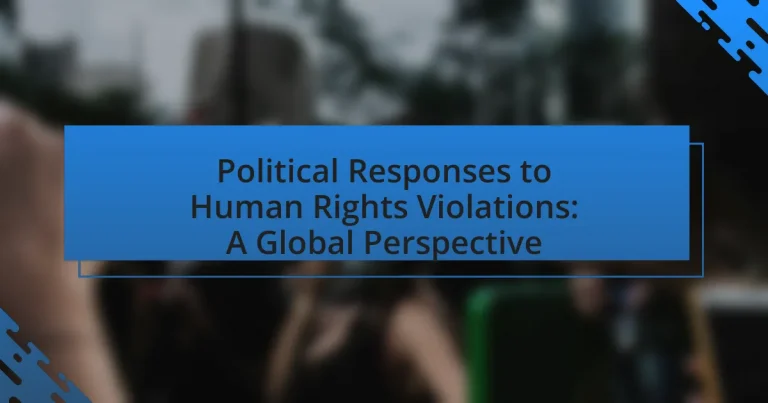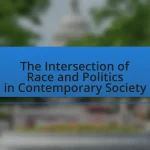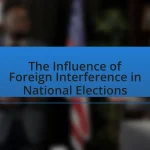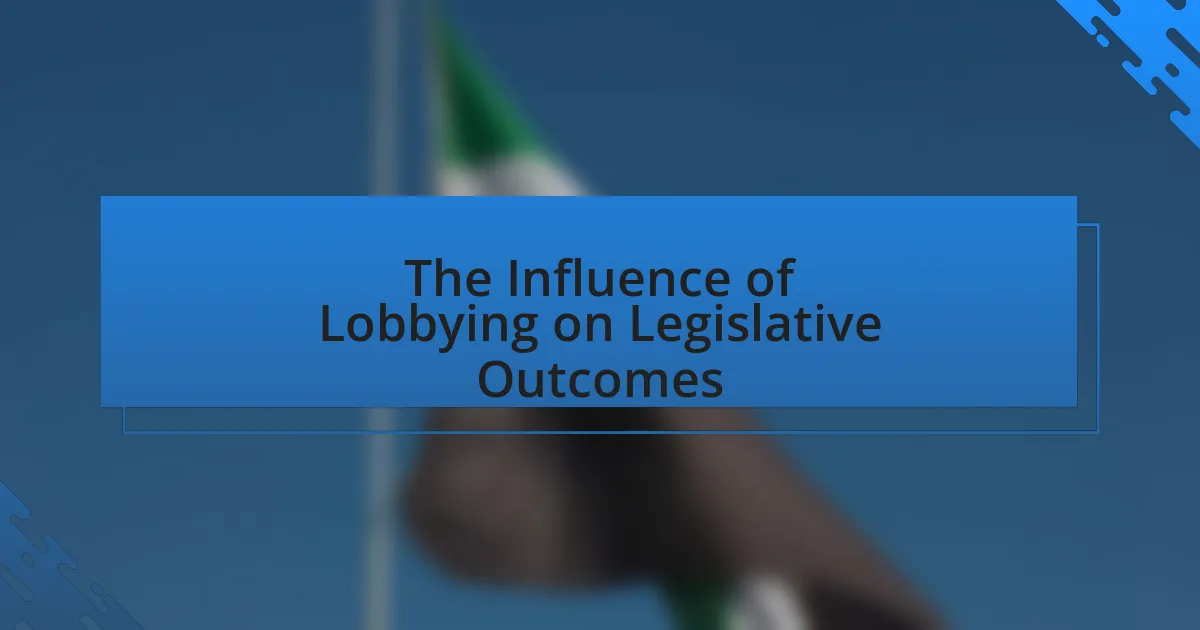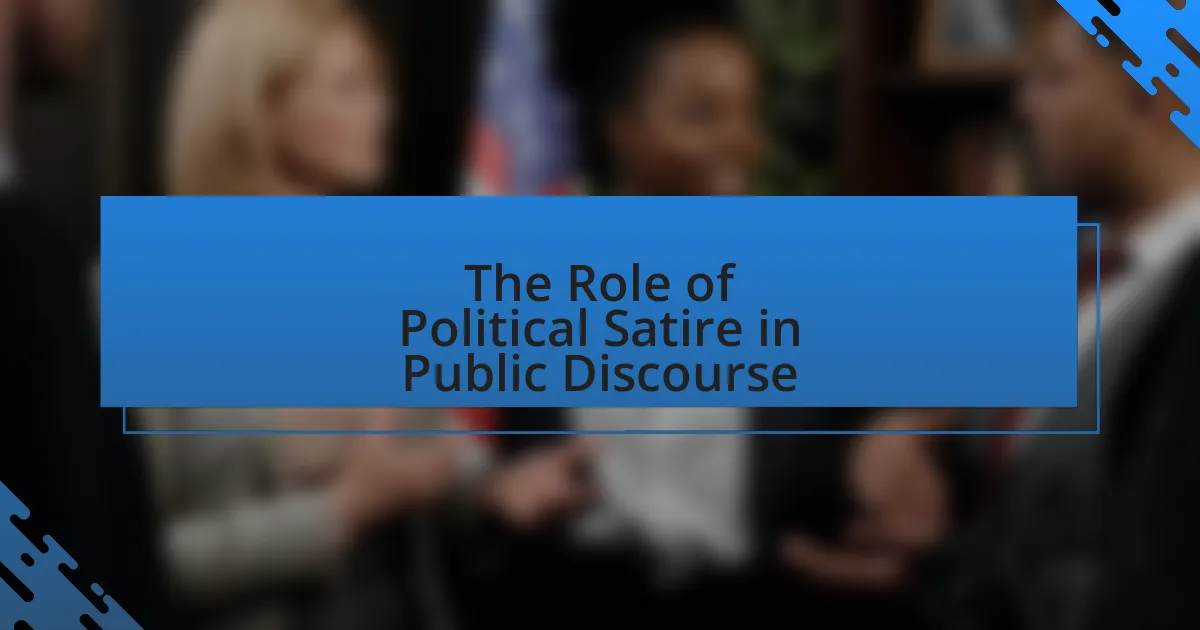The article examines political responses to human rights violations from a global perspective, focusing on various strategies employed by governments and international organizations. It outlines key responses such as diplomatic pressure, sanctions, and legal actions, while also discussing how different countries define and identify human rights violations based on cultural contexts and legal frameworks. The article highlights the importance of governmental accountability, the impact of public opinion, and the challenges faced in addressing violations, including geopolitical interests and inconsistent responses. Additionally, it explores the roles of regional organizations like the European Union and African Union in promoting human rights and the best practices that can enhance political responses to violations.
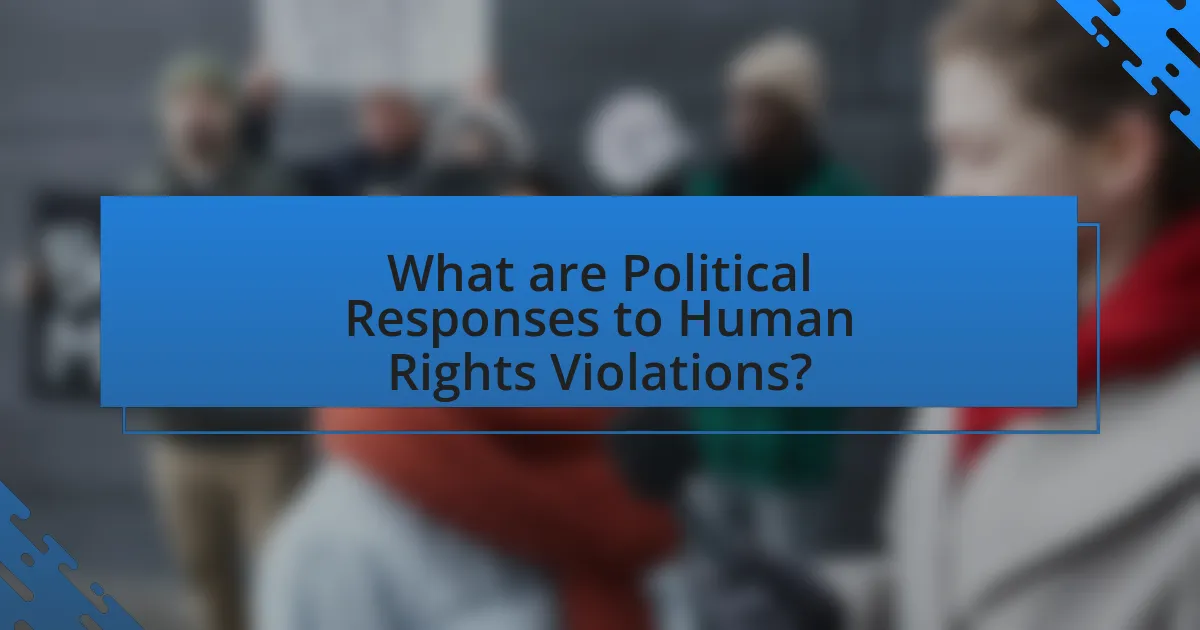
What are Political Responses to Human Rights Violations?
Political responses to human rights violations include diplomatic pressure, sanctions, and international legal actions. Governments and international organizations often employ diplomatic channels to urge states to cease violations, exemplified by the United Nations’ resolutions condemning human rights abuses in countries like Syria. Sanctions, such as those imposed by the U.S. and EU on North Korea for its human rights record, aim to compel compliance through economic pressure. Additionally, international legal actions, like those taken by the International Criminal Court against individuals for crimes against humanity, serve to hold violators accountable. These responses are grounded in international human rights law and reflect a collective commitment to uphold human dignity globally.
How do different countries define human rights violations?
Different countries define human rights violations based on their legal frameworks, cultural contexts, and international obligations. For instance, the United States identifies human rights violations through its Constitution and international treaties, emphasizing civil liberties such as freedom of speech and due process. In contrast, countries like China define violations in terms of state security and social stability, often prioritizing collective rights over individual freedoms. The European Union employs the European Convention on Human Rights as a benchmark, focusing on protecting individual rights against state abuses. These definitions are influenced by historical contexts, such as colonial legacies or authoritarian regimes, which shape how violations are perceived and addressed.
What criteria are used to identify human rights violations?
Human rights violations are identified based on criteria such as the infringement of fundamental rights, the severity of the act, and the intent behind the action. These criteria include the violation of civil and political rights, such as the right to life, freedom from torture, and freedom of expression, as well as economic, social, and cultural rights, including the right to education and health. The United Nations and various human rights organizations utilize these criteria to assess situations, often referencing international treaties like the Universal Declaration of Human Rights and the International Covenant on Civil and Political Rights. For instance, the systematic targeting of individuals based on race or political beliefs is classified as a violation due to its clear infringement on recognized rights and freedoms.
How do cultural contexts influence definitions of violations?
Cultural contexts significantly influence definitions of violations by shaping societal norms, values, and legal frameworks that determine what constitutes unacceptable behavior. For instance, practices viewed as violations in one culture, such as gender discrimination or corporal punishment, may be accepted or even endorsed in another, reflecting differing cultural beliefs and historical experiences. Research by the United Nations Human Rights Council indicates that cultural relativism plays a crucial role in how human rights are interpreted globally, leading to variations in the recognition and response to violations across different societies. This divergence underscores the importance of understanding cultural contexts when addressing human rights issues, as it affects both the perception and the enforcement of laws related to violations.
Why is it important for governments to respond to human rights violations?
It is important for governments to respond to human rights violations to uphold the rule of law and protect the dignity of individuals. Governments have a legal and moral obligation to ensure that human rights are respected, as outlined in international treaties such as the Universal Declaration of Human Rights. Failure to respond can lead to a culture of impunity, where violators are not held accountable, resulting in further abuses. For instance, according to the United Nations, countries that actively address human rights violations tend to experience greater social stability and economic development, as respect for human rights fosters trust in institutions and promotes social cohesion.
What are the potential consequences of inaction?
The potential consequences of inaction regarding human rights violations include the perpetuation of suffering, increased instability, and the erosion of international norms. When governments or organizations fail to respond to human rights abuses, victims continue to endure violations, leading to long-term psychological and social harm. Additionally, inaction can embolden perpetrators, resulting in further violations and escalating conflicts, as seen in regions like Syria, where lack of intervention has led to a humanitarian crisis. Furthermore, the absence of a strong international response undermines global human rights frameworks, weakening the collective commitment to uphold human dignity and justice, as evidenced by the decline in compliance with international human rights treaties when violations go unaddressed.
How do responses impact international relations?
Responses significantly impact international relations by shaping diplomatic ties and influencing global perceptions. For instance, when countries respond to human rights violations through sanctions or condemnations, it can lead to strained relations with the offending nation, as seen in the international community’s reaction to the Syrian government’s actions during the civil war. Such responses often result in increased isolation for the violator and can galvanize coalitions among nations advocating for human rights, thereby altering alliances and power dynamics. Historical examples, like the international sanctions imposed on South Africa during apartheid, demonstrate how collective responses can pressure governments to change their policies, ultimately affecting their standing in the global arena.
What types of political responses exist globally?
Political responses to human rights violations globally can be categorized into several types: diplomatic actions, economic sanctions, military interventions, and legal measures. Diplomatic actions include negotiations and public condemnations aimed at influencing state behavior, as seen in the United Nations’ resolutions against countries like North Korea for human rights abuses. Economic sanctions involve restricting trade or financial transactions to pressure governments, exemplified by the sanctions imposed on Iran due to its human rights record. Military interventions, though controversial, have occurred in cases like Libya in 2011, where international forces acted to protect civilians. Legal measures include international tribunals and courts, such as the International Criminal Court, which prosecutes individuals for crimes against humanity, reinforcing accountability for violations. These responses reflect a range of strategies employed by the international community to address human rights violations effectively.
How do diplomatic measures address human rights violations?
Diplomatic measures address human rights violations by facilitating dialogue, imposing sanctions, and leveraging international pressure to promote accountability. For instance, countries often engage in negotiations to encourage governments to improve their human rights records, as seen in the United Nations’ efforts to mediate conflicts and promote human rights standards globally. Additionally, sanctions imposed by nations or coalitions, such as the European Union’s sanctions against countries with egregious human rights abuses, serve to isolate offending states and compel them to change their behavior. These measures are supported by international treaties and agreements, such as the Universal Declaration of Human Rights, which establish norms that states are expected to uphold, thereby reinforcing the legitimacy of diplomatic interventions aimed at addressing human rights violations.
What role do sanctions play in political responses?
Sanctions serve as a critical tool in political responses to human rights violations by exerting economic and diplomatic pressure on offending states. These measures aim to compel governments to alter their behavior regarding human rights practices, often targeting specific sectors such as finance, trade, or military supplies. For instance, the United Nations imposed sanctions on South Africa during the apartheid era, which significantly contributed to the eventual dismantling of its oppressive regime. Additionally, targeted sanctions, such as asset freezes and travel bans on individuals responsible for human rights abuses, have been employed by various countries to signal disapproval and encourage accountability. The effectiveness of sanctions in achieving political change is supported by historical examples, demonstrating their role in influencing state behavior and promoting human rights globally.
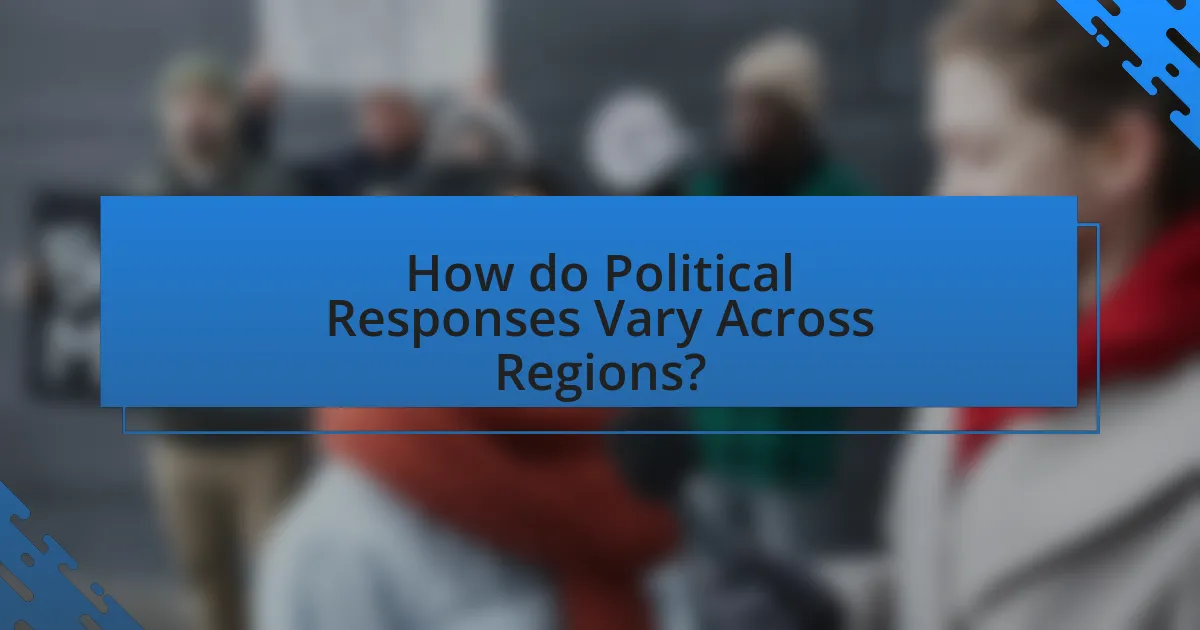
How do Political Responses Vary Across Regions?
Political responses to human rights violations vary significantly across regions due to differing political systems, cultural contexts, and historical backgrounds. For instance, in Western democracies, responses often include sanctions, diplomatic pressure, and public condemnation, as seen in the European Union’s actions against countries like Belarus for human rights abuses. Conversely, in authoritarian regimes, responses may involve denial, repression of dissent, or propaganda, as evidenced by China’s handling of protests in Hong Kong. Additionally, regions with ongoing conflicts, such as the Middle East, may see political responses that prioritize stability over human rights, leading to a lack of accountability for violations. These variations highlight how local political dynamics shape the nature and effectiveness of responses to human rights issues.
What are the differences in responses between democratic and authoritarian regimes?
Democratic regimes typically respond to human rights violations through legal frameworks, public accountability, and civil society engagement, while authoritarian regimes often employ repression, censorship, and state-controlled narratives. In democracies, mechanisms such as independent judiciary systems and free press facilitate investigations and promote transparency, as seen in countries like Sweden, where human rights violations are addressed through legal recourse and public discourse. Conversely, authoritarian regimes, exemplified by North Korea, suppress dissent and manipulate information to maintain control, often denying any wrongdoing and punishing those who speak out. This fundamental difference in approach reflects the underlying values of governance, with democracies prioritizing individual rights and accountability, while authoritarian regimes focus on maintaining power and control.
How do democratic governments typically respond to violations?
Democratic governments typically respond to violations by implementing legal frameworks, conducting investigations, and holding accountable those responsible. These responses often include the establishment of independent commissions to investigate allegations, the prosecution of offenders through judicial systems, and the enactment of policies aimed at preventing future violations. For instance, after the Rwandan Genocide, the International Criminal Tribunal for Rwanda was established to prosecute those responsible, demonstrating a commitment to accountability. Additionally, democratic governments may impose sanctions or diplomatic pressure on states that perpetrate violations, as seen in the international response to human rights abuses in Myanmar. These actions reflect a broader commitment to uphold human rights and the rule of law within democratic societies.
What strategies do authoritarian regimes employ to handle violations?
Authoritarian regimes employ strategies such as repression, propaganda, and legal manipulation to handle violations. Repression involves the use of state security forces to intimidate, detain, or eliminate dissenters, as seen in countries like North Korea and Syria, where opposition is met with violence. Propaganda is utilized to shape public perception and justify actions taken against violators, often portraying them as threats to national security. Legal manipulation includes the enactment of laws that criminalize dissent or restrict freedoms, allowing regimes to target individuals under the guise of legality, as evidenced by the use of anti-terrorism laws in Russia to suppress political opposition. These strategies collectively maintain the regime’s control and suppress human rights violations.
How do regional organizations influence political responses?
Regional organizations influence political responses by facilitating cooperation among member states, establishing norms, and providing platforms for dialogue and negotiation. For instance, the African Union has mechanisms like the African Charter on Human and Peoples’ Rights, which encourages member states to uphold human rights standards and respond collectively to violations. This collective approach can lead to coordinated sanctions or diplomatic pressure against offending states, as seen in the AU’s response to the political crisis in Madagascar in 2009, where it suspended the country’s membership until a return to constitutional order was achieved. Such actions demonstrate how regional organizations can shape political responses through established frameworks and collective action.
What role do the European Union and African Union play in addressing violations?
The European Union (EU) and African Union (AU) play significant roles in addressing human rights violations through diplomatic, legal, and economic measures. The EU employs mechanisms such as sanctions, diplomatic pressure, and funding for human rights initiatives to promote accountability and compliance with international human rights standards. For instance, the EU has imposed sanctions on countries like Belarus for human rights abuses, demonstrating its commitment to addressing violations.
Similarly, the AU has established frameworks like the African Charter on Human and Peoples’ Rights, which obligates member states to uphold human rights and provides a platform for addressing violations. The AU also conducts investigations and can impose sanctions on member states that fail to comply with its human rights obligations, as seen in its response to the political crisis in Sudan.
Both organizations collaborate on initiatives to strengthen human rights protections, exemplifying their commitment to addressing violations on their respective continents.
How effective are regional treaties in promoting human rights?
Regional treaties are effective in promoting human rights, as they establish binding commitments among member states to uphold and protect individual rights. For instance, the European Convention on Human Rights has led to significant legal advancements and the establishment of the European Court of Human Rights, which has adjudicated thousands of cases, reinforcing human rights standards across Europe. Additionally, the African Charter on Human and Peoples’ Rights has facilitated the promotion of civil, political, and economic rights in African nations, evidenced by the African Commission on Human and Peoples’ Rights’ role in monitoring compliance and addressing violations. These treaties create frameworks for accountability and provide mechanisms for individuals to seek justice, thereby enhancing the overall effectiveness of human rights promotion within their respective regions.
What impact does public opinion have on political responses?
Public opinion significantly influences political responses by shaping policymakers’ decisions and actions. When a substantial portion of the public expresses concern over human rights violations, elected officials often feel pressured to respond in ways that align with public sentiment to maintain their support and legitimacy. For instance, studies have shown that during the Arab Spring, widespread public outcry against authoritarian regimes prompted governments to implement reforms or face potential uprisings. Additionally, surveys indicate that politicians are more likely to advocate for international interventions or sanctions in response to human rights abuses when there is strong public support for such measures. This correlation underscores the critical role of public opinion in driving political accountability and responsiveness in the context of human rights.
How do protests and activism shape government actions?
Protests and activism significantly influence government actions by raising public awareness and pressuring officials to respond to social issues. For instance, the Civil Rights Movement in the United States during the 1960s led to landmark legislation such as the Civil Rights Act of 1964 and the Voting Rights Act of 1965, demonstrating how organized activism can result in substantial policy changes. Additionally, the global climate strikes initiated by youth activists have compelled governments to adopt more aggressive climate policies, as seen in the European Union’s Green Deal, which aims to achieve carbon neutrality by 2050. These examples illustrate that sustained activism can lead to tangible governmental reforms and policy shifts in response to public demands.
What is the role of media in influencing political responses?
The media plays a crucial role in influencing political responses by shaping public opinion and framing issues related to human rights violations. Through reporting, analysis, and commentary, media outlets can highlight injustices, mobilize public sentiment, and pressure political leaders to take action. For instance, the coverage of the Rwandan Genocide in 1994 significantly impacted international awareness and response, leading to discussions about humanitarian intervention. Studies have shown that media exposure correlates with increased public advocacy for human rights policies, demonstrating its power to drive political agendas and responses.
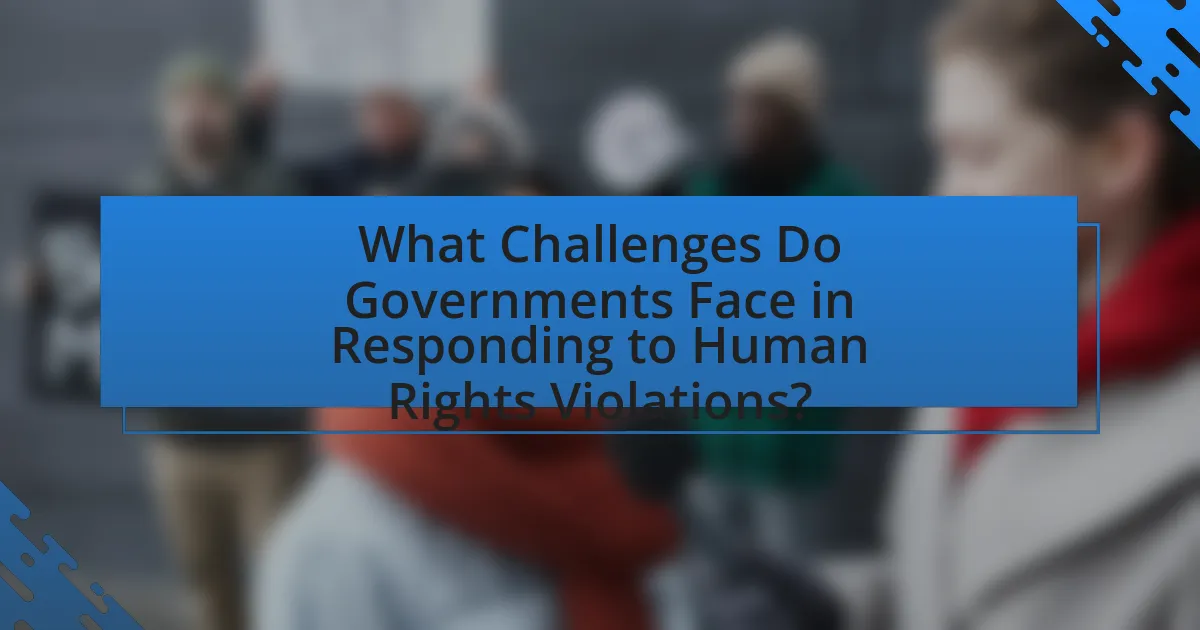
What Challenges Do Governments Face in Responding to Human Rights Violations?
Governments face significant challenges in responding to human rights violations, primarily due to political, legal, and social factors. Political challenges include the influence of powerful interest groups that may resist accountability measures, as seen in countries where authoritarian regimes prioritize stability over human rights. Legal challenges arise from inadequate legal frameworks that fail to protect victims or hold perpetrators accountable, exemplified by nations lacking comprehensive human rights legislation. Social challenges involve public apathy or fear, which can hinder advocacy efforts and discourage victims from seeking justice, as evidenced in societies where stigma surrounds reporting abuses. These interconnected challenges complicate effective governmental responses to human rights violations.
What are the legal and political obstacles to effective responses?
Legal and political obstacles to effective responses include insufficient legal frameworks, lack of political will, and the influence of national sovereignty. Insufficient legal frameworks hinder accountability, as many countries lack comprehensive laws to address human rights violations. The lack of political will often results from governments prioritizing stability or economic interests over human rights, leading to inaction or inadequate responses. Additionally, the principle of national sovereignty can prevent international intervention, as states may resist external pressure or oversight, arguing it infringes on their autonomy. These factors collectively impede the establishment of robust mechanisms for addressing human rights violations effectively.
How do international laws affect national responses?
International laws significantly influence national responses by establishing legal frameworks that countries are expected to follow regarding human rights and humanitarian issues. These laws, such as the Universal Declaration of Human Rights and various treaties, compel nations to align their domestic policies with international standards. For instance, countries that ratify the Convention Against Torture are legally obligated to prevent torture and ill-treatment within their jurisdictions. Failure to comply can result in international condemnation, sanctions, or loss of credibility in the global arena, as seen in cases like the United Nations’ actions against nations that violate human rights norms. Thus, international laws serve as both a guideline and a pressure mechanism for national governments to uphold human rights standards.
What challenges arise from political will and leadership?
Challenges arising from political will and leadership include inconsistency in policy implementation, lack of accountability, and resistance to change. Inconsistent political will can lead to fluctuating support for human rights initiatives, undermining their effectiveness. For example, leaders may prioritize short-term political gains over long-term human rights commitments, resulting in policies that are not sustained. Additionally, a lack of accountability can foster environments where human rights violations go unpunished, as leaders may evade responsibility for their actions or inactions. Resistance to change often stems from entrenched interests or fear of losing power, which can hinder necessary reforms aimed at addressing human rights violations. These challenges are evident in various global contexts, where political leaders face pressure from both domestic and international actors, complicating their ability to uphold human rights standards consistently.
How do geopolitical interests complicate responses?
Geopolitical interests complicate responses to human rights violations by prioritizing national security and economic benefits over humanitarian concerns. For instance, countries may choose to overlook or downplay human rights abuses in nations that are strategically important for trade or military alliances, such as the U.S. maintaining relations with Saudi Arabia despite its human rights record. This selective engagement often leads to inconsistent policies and undermines international human rights norms, as seen in the United Nations’ challenges in addressing violations in countries with powerful allies.
What examples illustrate conflicts between national interests and human rights?
Conflicts between national interests and human rights are exemplified by the U.S. government’s support for authoritarian regimes during the Cold War, such as in Chile under Augusto Pinochet, where strategic geopolitical interests took precedence over human rights abuses. Additionally, China’s treatment of Uighurs in Xinjiang illustrates this conflict, as many countries prioritize economic relations with China over condemning human rights violations. The arms trade with Saudi Arabia, despite its involvement in the Yemen conflict and associated human rights violations, further exemplifies how national interests can overshadow human rights concerns.
How do alliances and partnerships influence response strategies?
Alliances and partnerships significantly influence response strategies by enhancing collective action and resource sharing among nations or organizations addressing human rights violations. For instance, when countries form alliances, they can coordinate diplomatic efforts, impose sanctions, or provide humanitarian aid more effectively than acting alone. Historical examples include the European Union’s collective response to human rights abuses in Belarus, where member states collaborated to impose sanctions and support civil society initiatives. This collaborative approach not only amplifies the impact of their responses but also demonstrates a unified stance that can pressure violators more effectively.
What are the implications of inconsistent responses to violations?
Inconsistent responses to violations undermine the credibility of political institutions and can lead to increased human rights abuses. When governments or organizations fail to respond uniformly to violations, it creates a perception of bias and selective enforcement, which can embolden perpetrators. For instance, the United Nations has documented that inconsistent international responses to human rights violations, such as those in Syria and Myanmar, have resulted in prolonged suffering and instability in those regions. This inconsistency can also erode public trust in governance and international bodies, as seen in various global surveys indicating that citizens are less likely to support institutions perceived as ineffective or unjust.
How does selective intervention affect global human rights standards?
Selective intervention undermines global human rights standards by creating a precedent for inconsistency in the application of human rights norms. When interventions are based on political interests rather than universal human rights principles, it leads to selective enforcement, where certain violations are addressed while others are ignored. For instance, the United Nations’ response to the Syrian civil war has been criticized for its lack of action compared to interventions in Libya, highlighting how geopolitical interests can dictate the urgency and nature of responses. This inconsistency can erode the credibility of international human rights frameworks and diminish the perceived universality of human rights, as states may prioritize their strategic interests over the protection of human rights in specific contexts.
What are the long-term consequences of failing to address violations?
Failing to address violations of human rights can lead to entrenched systemic injustice and societal instability. When violations go unaddressed, they often result in a culture of impunity, where perpetrators feel empowered to continue their actions without fear of consequences. This can perpetuate cycles of violence and discrimination, eroding trust in institutions and governance. Historical evidence shows that countries with unresolved human rights violations, such as Argentina during its Dirty War, experienced long-lasting social divisions and political unrest. Additionally, the lack of accountability can hinder reconciliation efforts, making it difficult for societies to heal and move forward. Ultimately, the failure to address these violations can lead to ongoing human rights abuses, diminished rule of law, and weakened democratic processes.
What best practices can enhance political responses to human rights violations?
Best practices that can enhance political responses to human rights violations include establishing clear legal frameworks, promoting accountability through independent investigations, and fostering international cooperation. Clear legal frameworks provide a basis for action and ensure that violations are addressed consistently, as seen in countries with robust human rights laws. Independent investigations, such as those conducted by the International Criminal Court, help to hold perpetrators accountable and restore public trust in governance. Additionally, international cooperation, exemplified by coalitions like the United Nations Human Rights Council, facilitates the sharing of best practices and resources, enabling countries to respond more effectively to human rights abuses.
How can governments improve their accountability mechanisms?
Governments can improve their accountability mechanisms by implementing transparent reporting systems and independent oversight bodies. Transparent reporting systems allow citizens to access information about government actions and expenditures, fostering trust and enabling public scrutiny. Independent oversight bodies, such as ombudsmen or audit institutions, can investigate complaints and ensure compliance with laws and regulations, thereby enhancing accountability. For instance, the establishment of the Independent Commission Against Corruption in Hong Kong has led to significant improvements in public sector accountability, as evidenced by a marked decrease in corruption cases since its inception in 1974.
What role does international cooperation play in strengthening responses?
International cooperation plays a crucial role in strengthening responses to human rights violations by facilitating the sharing of resources, expertise, and best practices among nations. This collaboration enhances the effectiveness of interventions, as seen in joint efforts like the United Nations Human Rights Council, which enables countries to collectively address and monitor human rights abuses. Furthermore, international treaties and agreements, such as the International Covenant on Civil and Political Rights, exemplify how cooperative frameworks establish accountability mechanisms that compel states to uphold human rights standards. These cooperative efforts lead to more robust and coordinated responses, ultimately fostering a global environment that prioritizes the protection of human rights.
